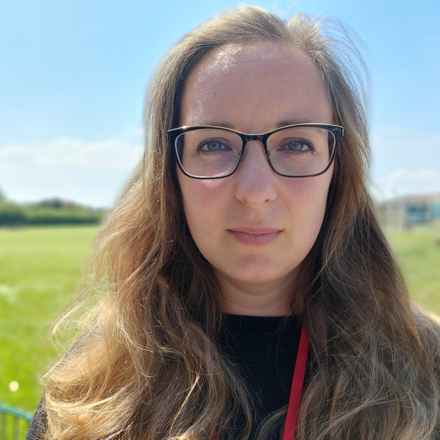"You don’t know what it’s like until it happens to you”
Posted: Monday 21 June 2021
"My initial diagnosis was a mess. I had an awful experience with the hospital, lots of tests and conflicting advice, and nobody even came back to me to tell me what was wrong."
Nic was diagnosed with macular disease at the age of 28. In Macular Week, she shares her story.
"It was only when I went for a routine appointment to check my vision that the doctor said, “Your eyesight is deteriorating because of your diagnosis.” And I said, “I don’t know what my diagnosis is, nobody has told me.” And he just very bluntly replied, “It’s Stargardt disease, and it leads to blindness.” And that’s all he said.
"I was traumatised by that experience. I was 28, and hearing that I would completely lose my vision was devastating and, more importantly, incorrect. At the time I thought, “Well, that’s my job gone, that’s my career gone, that’s me ever having a family: gone.” And despite being a pretty positive person, I felt helpless and really quite frightened.
"Unless someone in your family has been affected by sight loss, you just hear the word ‘blindness’ and you automatically think of darkness. You don’t understand that there are so many different degrees to it.
"I sought more information on my condition after that first diagnosis, so that I could try to plan my future. I am a teacher, and immediately I thought I would have to give that up. In the first few years, I worried that people would think I was stupid, that there was a perception that perhaps I couldn’t read, when of course I can – it’s just a challenge. I needed to get over that worry of what other people might think.
"It was a relief to discover the Macular Society, and I decided to speak to one of their counsellors. I just needed to get things off my chest to someone I didn’t know, who would maybe understand. I have also done some mentoring, through the Macular Society, for working age and young people like me diagnosed with macular disease. It has been such a positive for me – helping people going through the same thing. Because, with the best will in the world, nobody truly understands unless they too have had their lives turned upside down by this disease.
"Because it is hard. The mental impact of sight loss is hugely underestimated. It’s not just one diagnosis. You don’t know how long it’s going to take for the disease to progress – that’s the most unsettling thing. It’s every time you go to an eye appointment, every time you go to a card machine, and you can’t see the keypad to enter your PIN. It’s the little things – and the big things. I haven’t been able to drive for three years now. I’ve found that incredibly hard, because it really feels like my independence has been taken away from me.
"I decided to take part in a study at Moorfields, looking into how eyesight changes over time. I wanted to contribute because I know it will bring scientists closer to finding a cure. Those of us who have this disease, we just want to get on with our lives.
"We just desperately want a cure."
